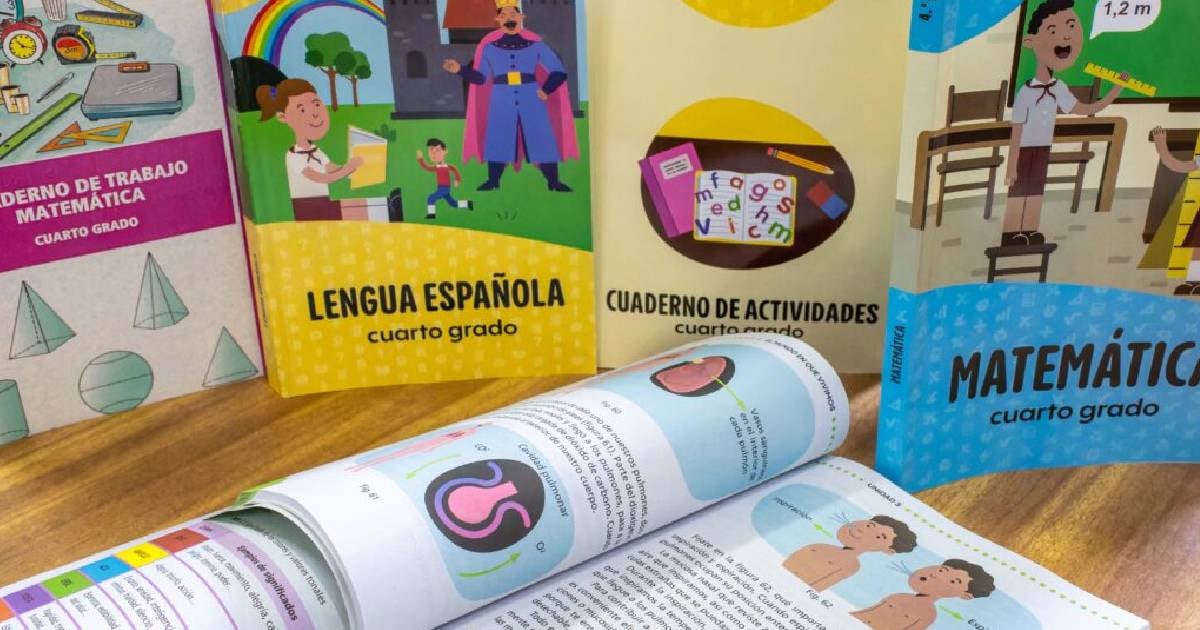
The Observatory of Academic Freedom (OLA) has expressed its concern over the new textbooks that the regime has distributed to its students in the current school year, where it accuses an intensification of indoctrination.
Through a statement, OLA speaks out about the Third Improvement of Education in Cuba, in which a total of 506 textbooks and workbooks were redesigned in collaboration with the Ministry of Education (MINED), the publishing house Pueblo y Educación, and the Higher Institute of Design (ISDi).
The Observatory indicates that the new materials were given to first and fourth grade students in the past school year, and that for the current year, their delivery is scheduled for second and fifth grade students.
A report from the official channel TV Yumurí stated that, in addition to the mentioned grades, students from seventh grade of basic secondary education and tenth grade in pre-university, along with first-year students of Technical and Vocational Education, Teacher Training, as well as those studying education for youth and adults, also received them.
In its complaint, OLA emphasizes that it is not the design that is most concerning in these new textbooks, but "the strong doctrinal bias in their pages."
"Convinced of the increasingly limited reach of their ideological framework, the Cuban state continues to bet on school manipulation from the early stages of intellectual development," they point out.
It is possible to see in the new content figures that did not stand out in previous texts, such as the Cuban ruler Miguel Díaz-Canel, or the exaltation of Che, Fidel Castro, and Celia Sánchez. "Now, if we carefully leaf through the reading book given to first-grade children, we will observe a greater presence of images associated with the 'Revolution,' and it is that to teach the youngest the correct use of letters, as many 'Fidelista historical milestones' as possible were used," they detail.
Previously, the educational process focused on exalted social figures related to the period following Fidel Castro's rise to power. It was common to find texts that referenced the planting and harvesting of sugarcane, highlighted the figure of the militiaman, the worker as the pillar of the new society, and, of course, the previous struggle of the rebels.
The scope of these changes and the concern about their implementation led OLA to urge UNESCO and the Latin American Laboratory for Educational Quality Evaluation to conduct a thorough review of the new teaching materials distributed, with the aim of correcting their ideological control over the new generations of Cubans.
Add to that the quality in the making of the books that will be passed from hand to hand. "Among the measures adopted for their preservation is the numbering to ensure control, and it has been indicated that they can be covered, but without adding clips or sealing the covers," explained Yainet Trejo Moreno, deputy director of Education in Matanzas.
These new books have caught the attention of the children's parents, who have become interested in the content they contain and the dangers associated with the ideals they convey.
The indoctrination of young students is a systematic practice in Cuban education and has diverse expressions in the Cuban regime's imagery. In February of this year, a video showing a teacher who is a member of the Communist Party visiting a fifth-grade classroom to talk to the children about the "honor" of being a militant generated a multitude of criticisms.
The school year in Cuba is filled with moments when students are mobilized for propaganda events aimed at forging their "revolutionary consciousness," whether it's from May Day to laying flowers for Camilo.
What do you think?
COMMENTFiled under: